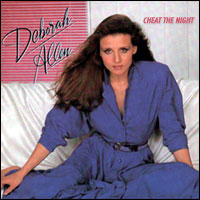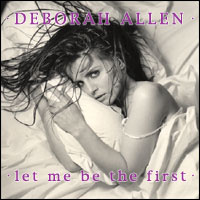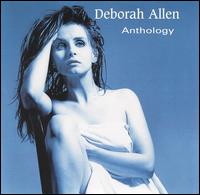|
Music Reviews
Alternative
Blues
Books
Christmas
Classic Rock
Country
Jazz
Lounge
Oldies
Power Pop
Punk & New Wave
Reggae
Rhythm & Blues
Seventies
Texas
Special Features
Randy's Rodeo
Sex Pistols
Motown
Halloween
Valentine's Day
Information
About Me
Feedback
Links
User's Guide
Support Me
Amazon
iTunes
Sheet Music Plus
|
Sock it to me, Santa! Visit my other website, www.hipchristmas.com Visit my other website, www.hipchristmas.com
 Over
the course of more than 30 years, comely Deborah
Allen blazed a trail through Nashville quite unlike any other, fraught
with seeming contradictions and unexpected left turns. She launched her career
on the
basis of her country credibility (specifically, her vocal resemblance to Patsy
Cline), but she earned her greatest fame with unabashedly slick pop records
such
as "Baby I Lied." Praised for her voice, she chose to emphasize her
writing, publishing hundreds of songs recorded by artists as diverse as Loretta
Lynn, Millie Jackson, and Fleetwood Mac. A natural beauty with a mug tailor-made
for Music City, Allen was unafraid to tart up her corn-fed good looks with daring haute couture,
dramatic cosmetics, and Hollywood hair styles. And though Deborah Allen's music
never scaled the heights of her acknowledged forebears
(Dolly
Parton, Aretha Franklin, George Jones, et al.), her singular individuality and
her commitment to craft has been unfailing and impressive throughout. Over
the course of more than 30 years, comely Deborah
Allen blazed a trail through Nashville quite unlike any other, fraught
with seeming contradictions and unexpected left turns. She launched her career
on the
basis of her country credibility (specifically, her vocal resemblance to Patsy
Cline), but she earned her greatest fame with unabashedly slick pop records
such
as "Baby I Lied." Praised for her voice, she chose to emphasize her
writing, publishing hundreds of songs recorded by artists as diverse as Loretta
Lynn, Millie Jackson, and Fleetwood Mac. A natural beauty with a mug tailor-made
for Music City, Allen was unafraid to tart up her corn-fed good looks with daring haute couture,
dramatic cosmetics, and Hollywood hair styles. And though Deborah Allen's music
never scaled the heights of her acknowledged forebears
(Dolly
Parton, Aretha Franklin, George Jones, et al.), her singular individuality and
her commitment to craft has been unfailing and impressive throughout.
Moving to Nashville at the tender age of 18, Deborah
Allen became the beneficiary of a remarkable series
of brushes with greatness, working for and with artists
who both taught her and helped her along. She sang
backup for Roy Orbison and Tennessee Ernie Ford, and
began writing songs with guidance from veteran tunesmith
Shel Silverstein ("A Boy Named Sue," "Cover
Of The Rolling Stone"). Then Jim Stafford, a singer/songwriter
best known for novelties like "Spiders & Snakes"
and "My Girl Bill," asked Allen to join his
act. In the mid 70's Allen moved to Los Angeles to
appear with Stafford on both television and stage;
soon, the striking young singer's star was on the rise.
 After
a couple of years on the west coast, Deborah Allen moved back to Nashville, continuing
to write for other artists and perform solo. Allen's powerful voice caught the
ear of RCA Records, who tagged her to complete several songs by country crooner
Jim Reeves. Despite having perished in a plane crash in 1964, Reeves was still
a presence on the country charts due to a large backlog of session work and the
skilled marketing department at RCA. Among his many hits, Reeves had recorded
duets with Patsy Cline, and these unfinished tracks were perfect for that format
- given the right singer. Allen's voice - which combed the high and lonesome
pedigree of Dolly Parton with Cline's throaty sophistication - was ideally matched
to Reeves' baritone, and she polished off her duets with the deceased singer
as though she and "the Country Gentleman" were in the same room. All
three duets
graced the Country Top 10, and Allen was quickly snatched up by Capitol Records. After
a couple of years on the west coast, Deborah Allen moved back to Nashville, continuing
to write for other artists and perform solo. Allen's powerful voice caught the
ear of RCA Records, who tagged her to complete several songs by country crooner
Jim Reeves. Despite having perished in a plane crash in 1964, Reeves was still
a presence on the country charts due to a large backlog of session work and the
skilled marketing department at RCA. Among his many hits, Reeves had recorded
duets with Patsy Cline, and these unfinished tracks were perfect for that format
- given the right singer. Allen's voice - which combed the high and lonesome
pedigree of Dolly Parton with Cline's throaty sophistication - was ideally matched
to Reeves' baritone, and she polished off her duets with the deceased singer
as though she and "the Country Gentleman" were in the same room. All
three duets
graced the Country Top 10, and Allen was quickly snatched up by Capitol Records.
Trouble
In Paradise, Allen's 1980 debut for Capitol, was well-received, spawning
several minor country hits. Then, singer Janie Fricke took one off Allen's
compositions, "Don't Worry 'Bout Me Baby," to the top of the country
charts in 1982. Intrigue at Capitol, however, eventually resulted Allen's dismissal
from the label. Before she left, Deborah cut several pop-oriented tracks including "Baby
I Lied," the song that would make her a major star. RCA, already familiar
with Allen's potential, purchased the languishing masters from Capitol, releasing
them as a mini-LP, Cheat
The Night. "Baby I Lied" went Top 30 pop and Top 10 country,
and three other singles from the record also graced the upper reaches of the
country charts. The follow-up, Let
Me Be The First (1984), was even more radio-friendly, but its success was
limited to the country market. And if Let
Me Be The First pushed the country envelope, Telepathy (1987)
tore it to shreds, featuring a title cut written and produced by Prince (under
the pseudonym of Joey Coco). Suffice to say that Deborah Allen is no Sheena
Easton, and, predictably, the record bombed.
 The
1980's were a decade when crossover dreams were not simply acceptable in Nashville
- they were encouraged. Deborah Allen wore her pop ambitions like a badge of honor,
but the overly-polished production of her recordings - not to mention the garish
fashions she wore - seem horribly dated now. With hindsight, it's clear that Allen
succeeded artistically when she stayed true to her country roots, emphasizing substantial
songs rather than studio sheen. The
1980's were a decade when crossover dreams were not simply acceptable in Nashville
- they were encouraged. Deborah Allen wore her pop ambitions like a badge of honor,
but the overly-polished production of her recordings - not to mention the garish
fashions she wore - seem horribly dated now. With hindsight, it's clear that Allen
succeeded artistically when she stayed true to her country roots, emphasizing substantial
songs rather than studio sheen.
As the 80's wore on, Allen doggedly chased pop
glory, and she lost her core audience to the emerging "new traditionalism" of
artists like Randy Travis and Reba McEntire. Once again, she found herself adrift
without a label - though she continued to write hits for others, often in collaboration
with her husband, Rafe Van Hoy. Over the years, Deborah Allen has placed songs
with dozens of major country stars - Patty Loveless, LeAnn Rimes, Brooks & Dunn,
and Tanya Tucker, to name but a few - and a fair number of pop stars, as well.
In the early 1990's, Deborah Allen resumed her recording career, wisely choosing
to embrace country music. These records, including Delta
Dreamland (Warner Brothers, 1993) and All
That I Am (Giant 1994), sound thoroughly modern but resolutely organic, emphasizing
acoustic instruments rather than electronics. While each album was moderately successful,
Allen all but retired from recording afterwards, continuing perform onstage and
as a session musician, as well as scoring major hits as a songwriter. Her website
(www.deborahallen.com) chronicles her
busy schedule, including some new, self-released recordings.
All of Deborah Allen's original albums are out-of-print, and those prior to the
1990's have never been reissued on CD. Thankfully, Anthology (1998),
an exhaustive collection of her hits, was released by Renaissance Records. Though Anthology was
clearly produced on a tight budget, it compiles all 21 of Allen's charted singles,
including her rollicking holiday tune, "Rockin' Little Christmas." The
colorful booklet includes notes on each song by Allen herself. Though Renaissance
is now defunct, copies of Anthology are
not too hard to obtain. However, I strongly recommend avoiding Curb's Best
Of Deborah Allen (2000). Consisting largely of new recordings - including a
revision of "Baby I Lied" - the CD simply isn't "the best" of
anything. [top of page]
 Selected Deborah
Allen Albums Selected Deborah
Allen Albums
[top of page]
 Essential Deborah
Allen Songs Essential Deborah
Allen Songs
- After Tonight (1982)
- Baby I Lied (1983)
- Break These Chains (1994)
- Don't Let Me Cross Over (with Jim Reeves, 1979)
- Don't Worry 'Bout Me Baby (1982)
- Heartache And A Half (1984)
- I've Been Wrong Before (1983)
- If You're Not Gonna Love Me (1993)
- Nobody's Fool (1980)
- Oh, How I Miss You Tonight (with Jim Reeves, 1979)
- Rock Me (In The Cradle Of Love) (1993)
- Rockin' Little Christmas (1984)
- Take Me In Your Arms And Hold Me (with Jim Reeves, 1979)
- You (Make Me Wonder Why) (1981)
[top of page]
 Deborah Allen On The Web Deborah Allen On The Web
[top of page]
 Feedback Feedback
Your witty comments, impertinent questions, helpful suggestions, and angry denials
are altogether encouraged. Submit feedback via email;
submissions will be edited and posted at my discretion.
|
|